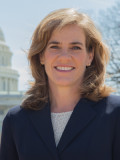 By General Counsel K. Hollyn Hollman
By General Counsel K. Hollyn Hollman
Even before Donald Trump called for “a total and complete shutdown of Muslims entering the United States until our country’s representatives can figure out what is going on,” the problem of religious scapegoating was destined to continue as a major theme into the new year and beyond. The outrageous proposal inspired quick condemnation from a variety of angles, including that of the BJC. Executive Director Brent Walker responded: “Donald Trump’s proposal to ban Muslims from entering the U.S. is un-American, unworkable, counterproductive and embarrassing. It’s no more than disgusting demagoguery — exploiting popular fear and fanning pervasive anti-Muslim bigotry for political gain. Americans deserve better than this from those who seek to lead.”
In the weeks since, Trump’s statement continues to generate debate among political pundits, elected officials, theologians and law professors. While condemned by many at home and abroad, the comments appeal to at least some segment of the American public, as Trump’s poll numbers reflect. Other candidates have asserted similarly problematic proposals, such as favoring refugees who are Christian.
This debate is just the latest example of a persistent problem. In an effort to explain violence, we look for easy answers, blaming a particular ethnicity or religion as if they are inherently violent. Addressing the threat of violence is among our government’s greatest challenges. A blanket ban against members of a particular religion (or non-believers), however, is not the answer and is antithetical to many American ideals, not the least of which is religious liberty for all.
As some experts have noted, the U.S. Supreme Court has upheld immigration bans based upon national origin, ancestry and political viewpoints. Without conceding the propriety of those bans, a ban or favoritism based upon religion is an entirely different matter. It would clash with the First Amendment’s protection of religious liberty, particularly the prohibition against laws “respecting an establishment of religion.”
There are practical, as well as moral and legal, reasons to oppose these proposals. As George Washington University law professors Ira Lupu and Robert Tuttle recently explained in a post on the American Constitution Society’s website, “The government cannot exclude someone as a Muslim unless there are criteria for determining which beliefs characterize one as a follower of Islam.” If a refugee applicant identifies as a Christian or a visa applicant denies being a Muslim, how would a bureaucrat verify the religious affiliation? Our government would have to create a religious litmus test of beliefs and practices and determine whether the applicant meets enough of the criteria to be Christian or Muslim. Just as Christian sects debate which groups are truly Christian, a similar debate happens among Muslim sects. For example, the Ahmadiyya consider themselves to be Muslim, but Pakistan designates them, including on state-issued passports, as non-Muslim. Fortunately, the Establishment Clause prohibits our government from invoking a religious shibboleth declaring some to be included and others excluded.
Baptists, among other religious groups, certainly know that there are often deep differences even among those who go by the same denominational name. Indeed, most religions are shaped by internal and external conflicts, sometimes leading to exclusion, schism and new religious groups. The religious liberty we enjoy recognizes that religion should be left free from unnecessary government involvement so that autonomous associations can define their beliefs and regulate their membership. It assumes that the government will not favor some religions over others in any legal sense. This practical aspect of religion — the tendency for religious traditions to change and multiply — is also implicit in the way our Constitution protects religion.
Religious liberty advocates, whether speaking as legal experts or congregational members, have an important role to play in these conversations, which challenge us to put our constitutional and ecclesiastical values to work. We should extend to others no less religious freedom than we ask for ourselves. Christians who don’t find the government competent to determine who is or is not a Christian should also recognize that the government is incapable of defining membership for other faiths.
The Gospel teaches that faith demands the freedom to believe or not believe. Inviting the government to define particular religions and give them second-class legal status would undermine this God-given freedom of conscience.
From the January 2016 Report from the Capital. Click here to read the next story.





